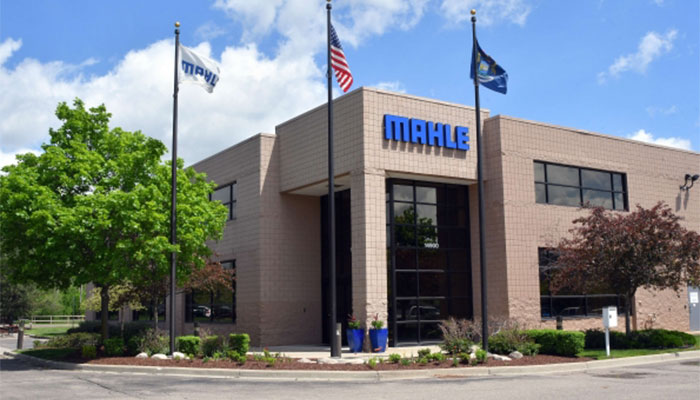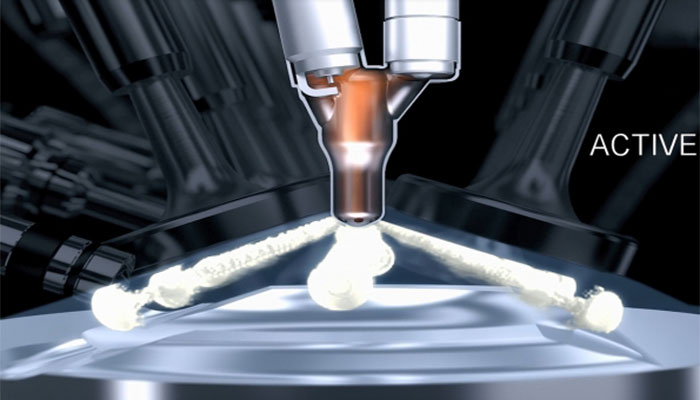- MAHLE Powertrain’s US team scoops prestigious award at IMechE conference.
- Award-winning paper investigated low load performance of MAHLE’s Jet Ignition pre-chamber technology.
- Active MJI set to boost ICE efficiency and reduce emissions…
An author partnership from MAHLE Powertrain in the US has been recognised for its work on pre-chamber ignition, presented at the Institute of Mechanical Engineers’ Internal Combustion Engines and Powertrain Systems conference in December 2019.

Pre-chamber ignition has been investigated since the early 1900s as a technology which promotes rapid ignition of lean fuel mixtures. MAHLE Jet Ignition’s design uses a very small auxiliary pre-chamber (less than 3% of the main chamber clearance volume). Once ignited, this pre-chamber discharges fast-moving, super-heated jets through a multi-orifice nozzle into the main combustion chamber, causing rapid, uniform ignition. MJI has two versions: The active system uses a small fuel injector in the pre-chamber as well as a spark plug, whereas passive MJI draws its charge from the main chamber during the compression stroke.
Four members of MAHLE Powertrain LLC’s research team co-authored the paper on the results of a study into progress in developing MJI technology. “We are grateful to have our work on pre-chamber ignition recognised in this way” says one of the authors, Mike Bunce, the company’s head of research. “It’s been a boost for the whole research team.”
Active MJI has previously demonstrated 20-30% improvements in engine efficiency. However, pre-chamber ignition has historically had challenges at low loads, especially at idle and catalyst heating conditions, including poor combustion stability and severely limited ability to retard spark timing. “Our study found that this is due to an arresting of the gas exchange process between the pre-chamber and the cylinder during the intake stroke induced by heavy throttling, meaning poor purging of residual gases from the pre-chamber,” says Bunce. “This in turn leads to unstable pre-chamber combustion which then propagates throughout the burning process in the cylinder.”
Auxiliary fuelled pre-chamber concepts such as active MJI can help. “Operating Active MJI with partial dilution at idle loads allows for more effective purging of residuals,” Bunce explains. “Under catalyst heating conditions, auxiliary fuelling provides more direct control over pre-chamber mixture preparation, resulting in reduced instability in the pre-chamber combustion event. These steps, in conjunction with other optimization activities, have resulted in our MJI multi-cylinder test engine achieving idle and catalyst heating performance comparable to those of modern SI engines without the need for a secondary igniter, and the study results represent real progress in ensuring jet ignition technology such as MJI can function successfully over the full range of operation required of modern engines.”
Emissions reduction and fuel economy
MAHLE Powertrain’s US facility at Plymouth, Michigan, has been responsible for Active MJI development, and the technology has demonstrated significant potential. “One challenge is that highly dilute mixtures can have adverse effects on emissions such as NOx,” says Bunce. “However, Active MJI ventures beyond Lambda 1.5, where NOx creation tails off due to lower temperatures, reducing the need for aftertreatment.”
“We were impressed by the MJI technology and the potential the active system shows for emissions reduction and fuel economy benefits”, says Steve Sapsford, Chair of the Powertrain Systems and Fuels Group at the IMechE and a member of the award’s technical panel.
Sir Dugald Clerk designed the world’s first successful two-stroke engine in 1878 and patented it in England in 1881. The Dugald Clerk prize is awarded annually by the IMechE to the authors of an original paper dealing with a subject with which he was associated.
The authors of the paper are Mike Bunce, Dr. Nathan Peters, Sai Krishna Pothuraju Subramanyam, and Hugh Blaxill. The paper citation is: Bunce, M., Peters, N., Subramanyam, S. K. P., Blaxill, H., “Assessing the Low Load Challenge for Jet Ignition Engine Operation,” Proceedings of the Institute of Mechanical Engineers Internal Combustion Engines and Powertrain Systems for Future Transport Conference, December 2019.
About MAHLE Powertrain
MAHLE Powertrain is a specialist in providing engineering services for the design, development and integration of advanced internal combustion engines and electrified powertrain systems. As a recognised expert in these fields, MAHLE Powertrain is engaged in the extensive research, development and application of new traditional and advanced drivelines into cost-effective, production feasible solutions for enhanced efficiency, improved fuel economy and lower emissions.
As a services subsidiary of the MAHLE Group, MAHLE Powertrain has eight technical centres strategically located in the UK, Germany, USA, China and Brazil and is well-placed to provide solutions around the globe. It operates independently of the main group when considering choice of components or technologies.
The MAHLE Group is well-known as a leading international development partner in the areas of engine systems, filtration, mechatronics and thermal management. It formed MAHLE Powertrain from the acquisition of the Cosworth powertrain development team in 2005.







